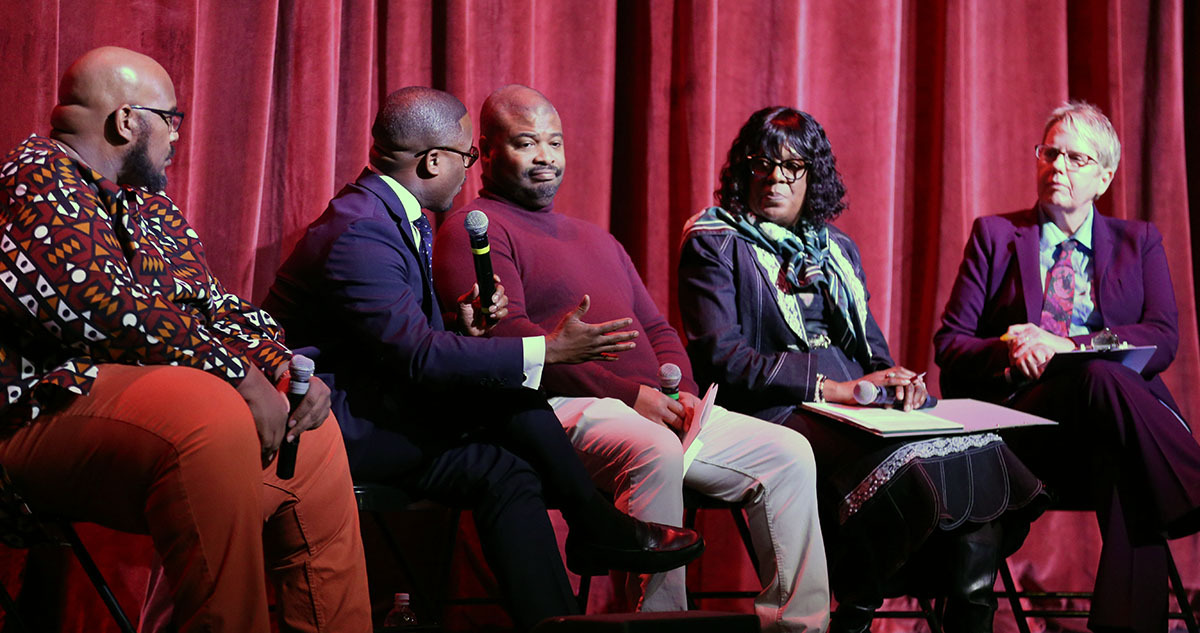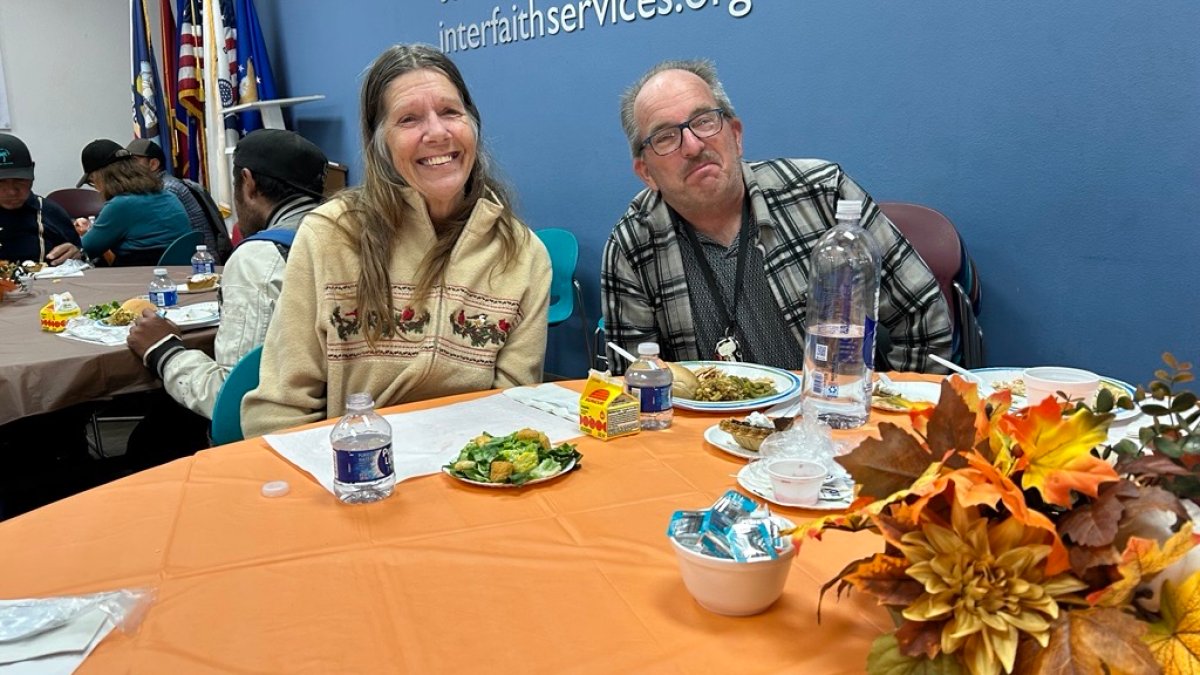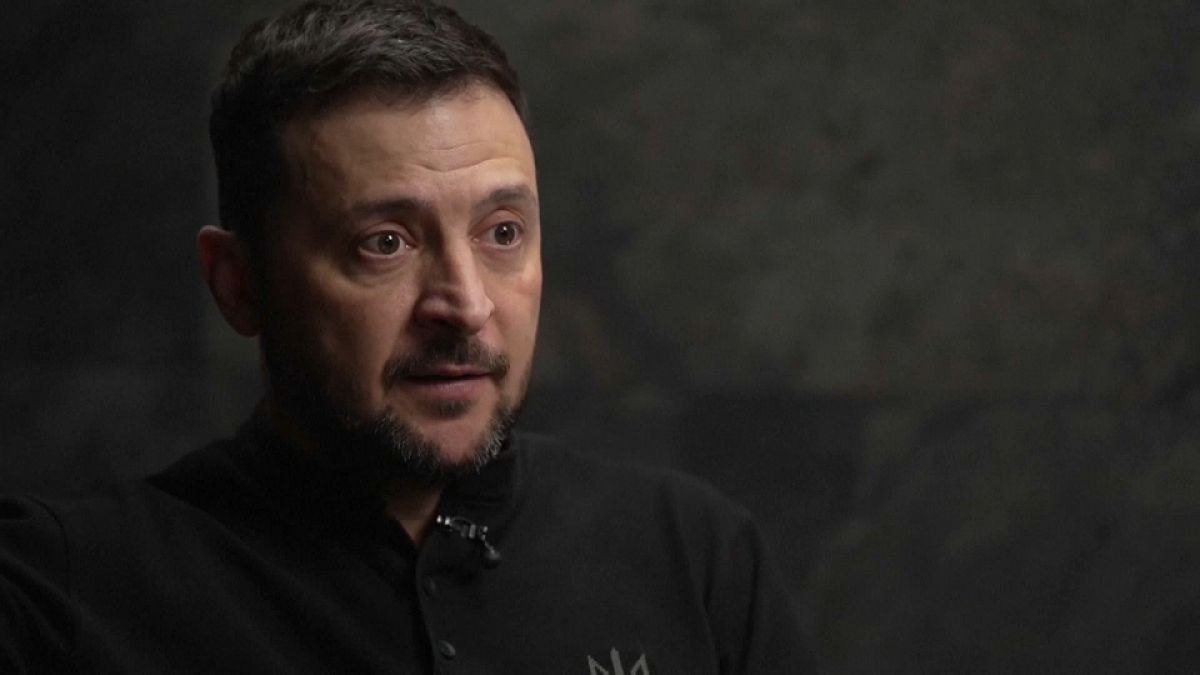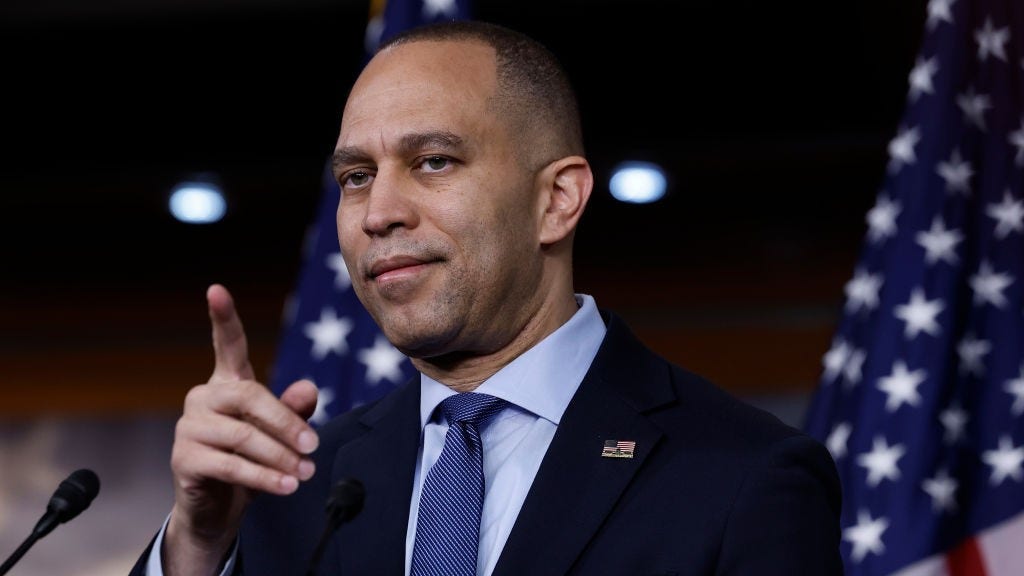Illinois
Black ministers and scholars discuss the state of the Black Church in Central Illinois – IPM Newsroom

What is the Black church?
According to Henry Louis Gates Jr., executive producer of The Black Church: This Is Our Story, This Is Our Song, “The Black church is the birthplace and the nurturing ground for the major social, cultural, educational, economic and political institutions that define Black America.”
What is the Black church in central Illinois?
An audience of more than 200 people came to The Virginia Theatre in Champaign to explore this question with a panel of Black church leaders and scholars of Black religions on Friday, December 15. The panel and audience watched the episode of Dr. Gates’ “The Black Church” that focuses on Reconstruction, Jim Crow laws and the rise of Black women in formal leadership roles in the Black church. This event was a presentation of Illinois Soul.
This story presents a summary of the major points of discussion. Audio transcripts of the entire discussion and audience Q & A are also provided here.
Entire panel discussion
Audience Q & A
WHAT IS BLACK RELIGION?
Professor Leonard McKinnis, scholar of African American religions in the Department of African American Studies and the Department of Religion at the U of I:
If a core of what gave birth to this institution, was the audacity and the courage of enslaved Africans who themselves rejected what I’m going to call a very violent theology. In other words, the enslavers found a way as the father of Black liberation theology, James Cone would say, to reconcile their understanding of Jesus and Black bodies hanging from trees. That’s a hell of a reconciliation. One weaponizes theology toward pursuing a particular kind of end. In this case, we’re talking about a world that was in bed with a very particular notion of capitalism, a very particular notion of what the human was, who could think, who had the intellectual capacity to think about things of God and thus went forth. So, at its earliest stage of the American experiment in democracy already exists a theology with a very violent God, a very violent God, that was complicit in the slave holding of kidnapped Africans. And so, in many ways, as these enslaved Africans are imagining their idea of God, and they are singing their songs, or what we call it, the brush harbor, the invisible place of worship, on the slave plantations, they are already thinking about a new theological venture. They are talking about the God of Exodus. And by the way, the God of Exodus was the God that was hidden from them. They are talking about the God of Luke, about a Jesus of liberation.
What I am curious about is the religious imagination of Black folk, that includes Christian faith, but also includes groups that have oftentimes been at odds with Christian faith been at odds with civil society like the Nation of Islam. The Moorish Science Temple. But what connects all of these groups – while they have different routes of thinking about the divine and their relationship to the divine, what connects all of these groups is that at some point in their history, they were wrestling with what it meant to be strangers in a place called home.
Reverend Terrance Thomas of Bethel AME Church in Champaign, the oldest Black church in Champaign, County:
I would argue though, that in the sense that the institutions you are talking about have been co-opted for at least for the past 50 years by prosperity gospel, it’s been co-opted by a gospel of White supremacy. And so, what you’re talking about has long been drowned out in our John Haggy Bible studies that’s in our Black churches. And Charles Stanley, right? So, in the church, were not talking about James Cone. We’re reciting White evangelical theology that is violent that supports empire that puts over and against.
Professor Leonard McKinnis
Folks love: “I Have a Dream,” but for me, one of his (Rev. Dr. Martin Luther King, Jr.) most significant speeches or sermons was called “Why Wait?” And the subtitle was “The Myth of Time.” King had this philosophy of the world where he said, he was talking to Alabama, he said before he came to Alabama, the governor wrote me and the legislators wrote me and said “The good Negros here in the south don’t want your radical message. He said stay where you are and do that stuff in those towns. But then King said, “We have this conception that if we just wait, things gonna work out. If we just take our time and play Kumbaya and pretend like everything is okay, time will fix itself. But King was a revolutionary. He was a radical. King did not believe that time will fix anything.
Dr. Jeff Trask, treasurer for the Dr. Rev. Martin Luther King Jr. Advocacy for Justice Committee, a predominately black organization that provides scholarships to students of color in Champaign County.
African American church leaders met with President Lincoln and then later with the General Sherman. In both cases, they were sought after to get advice as to how to move forward based on emancipation and what the next steps were for African Americans. You had this strong Black leadership and not only do you have to strong Black leadership, but they were able to go into this environment and not be intimidated and not hold back in terms of what they wanted. But to be intentional and direct about what they you sought for African Americans.
WHAT IS THE SPIRITUAL AND POLITICAL GROUNDING FOR THE CALL FOR REPARATIONS?
Dr. Jeff Trask
On a spiritual level, the idea of reparations has been around since the early Biblical days. In Genesis chapter 15, verses 13 and 14, it says “Then the Lord said to him, (this is Moses), know for certain that for 400 years, your descendants will be strangers and the country not their own, and that they will be enslaved and mistreated there. But I will punish the nation that they serve as slaves, and afterwards, they will come out with great possessions.”
And when it comes to this whole idea of reparations for our communities now, it is a spiritual thing. When I talk to people just that this is not just a political question. I know it has a lot of, you know, hot potato type of notion to the word reparations. But the reality is that it’s a spiritual matter. Prophets mentioned the idea of being one body, right, and what happens when one part of your body is hurting? You need to heal that one part of the body, so your whole body benefits. And so, reparations is healing that part of the body that’s hurt. And it’s really fascinating when we think about this idea of reparations being just political, when reality is that God wants us to all be whole.
Rev. Thomas
Reparations is a critical part of forgiveness and repentance. Jesus said, “When you repair when you want to make right with your bother.” We aren’t required to forgive or any of that until repentance and repairs are done. So, it’s a spiritual thing. But it’s an honest thing. And I want to lift up why this work is important. If you’ve ever read the 1619 project, if you ever read Up From Slavery, if you’ve read any of these things, not only was wealth taken from us during enslavement, right? Not only was wealth taken from us post reconstruction, but even in the 1920s when they went around burning down our towns, our houses, our churches, steal the land. Then they became millionaires off of that, right? And so, while we’re locked into generational poverty and cycles of harm, they’ve been able to build an empire. What’s often said by some Black folks, and especially a lot of White folks, is: “That happened in the past. We can’t fix that. We just need to forgive.” I don’t have to forgive nothing until you repair the harm and repay the debt. And that’s biblical.
Dr. Trask
That’s one quick thing I want to add two turns to the argument that this happened in the past. It doesn’t matter now. In every other way, other than the talk about reparations, this argument makes no sense. If my great grandfather was lynched before he had my grandfather, I wouldn’t exist. Right? So, history matters and past matters. We consider the United States you know, the wealthiest most powerful country in the world, right? No one really argues that: largest military, wealth beyond measure compared to the rest of the world. If you live here, you’re at a top 10% of wealth and world. Well, how did that come to be?
How did we get there? Because the United States is a relatively young country compared to the rest of the world. And so, in 1776, when this country was founded, it was brand new, it was zero on the economic list in terms of the rating scale. But by 1860, it was number two. And by about 70 short years, how did that happen? It was only second to Great Britain, who got a lot of economy from United States. Well, this thing called the cotton trade, and because of free labor, they were able to sell and deliver cotton at a cheaper price than anyone else in the world. And it was the ability for the United States to basically build their financial portfolio and become the wealthiest nation in the world. Think about that idea that Black slaves, Black laborers were the reason why this country is as powerful as it is. And as wealthy as it is. If you live in this country, you’re benefiting from that labor. And so therefore, you cannot say the past doesn’t matter, because it totally represents everything that’s going on today.
We all know the saying, you know, praise and love God, work is up to you. Right. And I do want to reiterate how important is to understand that reparations is a journey and not the destination. It took 400 years where we are now and it’s going to take who knows how long to get back to where we should have been the first place. It’s almost like you know, trying to try and lose weight you know, the weight comes on like that, but it takes forever to get it off. So why don’t we expect that it’s gonna come off as fast as we got it on? Racism is saturated in everything that we are and do in this country. We have to understand that we have to have an ongoing effort that will not stop to impact policies, to impact the legislation to impact resources and economies and there’s going to be an ongoing effort. And I think it is important to understand that this is a life journey. And we’ll never totally get there. But our role is to keep trying until we can’t try any longer.
Rev. Thomas
But I disagree with that. Jeff. We can get there. Part of the problem is we allow them this gradual emancipation, right? America loves the gradual, right? And what did they say in Brown (Brown v. Board of Education – 1954)? Schools need to be desegregated with all deliberate speed, right? We love the feet drag. Even Lincoln’s original emancipation plan is gradual emancipation that would have went to 1955. What I hear is when I look at how other ethnic groups have gotten there, it didn’t take a lifetime.
So, should we leave it up to God? I think always a part of our work is leave it up to God. But God has always empowered humanity to do the work. My favorite example of this is the feeding of the 5,000. Right? They went to Jesus and said, “Hey, man, we got to feed these people. And Jesus said, “You feed them.” So what did they do? They collected, then he performed the miracle. I’m suggesting that we have not collected we’ve not labored, we’ve not pushed America. The problem with Black Liberation movements, let me put on my Black Studies hat, is we don’t storm the castle. This reparation thing has been talked about since Reconstruction. And what happens is they throw us something they give us a Black mayor, they give us a Black alderman, they give us a Black president, right? I know y’all love Obama, but they give us a Black president. They give us these things. And we don’t storm the castle. Other ethnic groups don’t settle for less than reparations.
Dr. Trask
What my point is that what happened to African Americans overtime can never be made up for. That’s what I’m getting at. And so we just have to keep traveling towards making things better and improve things.
ARE THE CHURCHES IN THE MINISTERIAL ALLIANCE ALIGNED IN BLACK LIBERATION THEORY?
Rev. Thomas
No. The Ministerial Alliance has no Black liberation. They wouldn’t know James Cone from James Cleveland. No, they’re not aligned with Black liberation theology. And I love them. And I will tell them and I’ve said this is a big part of the reason why I didn’t run for a second term (on the Ministerial Alliance). They are grounded in White evangelical theology. They are grounded in White Jesus. They are grounded in King James. They are grounded in this type of death dealing theology that you can’t even honor a woman as your head.
There is a great book, Theron Williams, “Black Church, White Theology,” that talks about how we’ve allowed this to inculcate our spirit and it has made us stagnant in liberation in the pursuit of justice. Is the Ministerial Alliance about upholding the status quo and protecting itself and its concept of Christianity? Yes. And my Facebook is going to blow up tomorrow. So be it.
Apostle Blissit, senior pastor at Truth Pentecost Christian Center in Champaign
In 2009, a young Black man was killed: Kiwane Carrington (in Champaign). And I think that the community did a wonderful job in rallying together and peaceful protest. And Carol (Ammons) did a wonderful job getting all the pastors from various sects together. And we had a peaceful march. And we ended up at New Hope, I think, New Hope Church of God in Christ, and it was at least five to 700 people, I’ll never forget it. And that was my greatest memory of the Ministerial Alliance. And we used to stand as one and things got done, and we were in the spirit of togetherness, and a lot came out, a lot of good came out of that. And I saw that even various sects of churches and denominations, they came forth. And Carol led us and many other pastors, and I think the, for the most part, Urbana came together, but the Ministerial Alliance, you’re, right, they need much work and need to learn how to respect one another.
Professor McKinnis
The sort of reluctance of some Black churches to embrace Black liberation theology. In 2008, when then Senator Obama was running for president. He was a member at Trinity United Church of Christ in Chicago under the auspices of Jeremiah A. Wright, Jr. On Trinity’s website, it said then, and it says now. Jeremiah Wright wrote, “The Trinity of United Church of Christ is built upon the teachings of Black liberation theology, in the tradition of James Hal Cone.” That is on their website. What happened? Well, Fox News got ahold of it. And for about three weeks straight, Sean Hannity became a theologian. For about three weeks straight Sean Hannity became a theologian and held a forum on the dangers of Black Theology.
And then tried to make the case, because Barack Obama was clean, see. He was a clean candidate. They couldn’t get them on moral ethical issues, so, let’s go to his religion. Let’s go after his pastor. So, the Black church became well, a particular kind of Black church became under the spotlight during the 2008 election. Who would have ever thought that Fox News will be talking about Black liberation theology, but they did it in such a way to suggest that Black Theology was demonic, that it was racist, and that Barack Obama must be a racist.
IS IT DIFFERENT TODAY FOR BLACK WOMEN IN THE CHURCH?
Apostle Blissit
There has been a lot of resistance as a female pastor, but I took it and learn from it and move with grace. Because at the close of the day, I realized man did not call me. God called me. And the Bible teaches us what’s natural is natural, and spiritual is spiritual. So, everything I do, as opposed to pastoring is a totally different head than being a female, until we can get to that point and know that in Galatians, three and eight, I think he says that there is neither male nor female nor bond nor free but all that’s one in the Spirit. When we’re in the Spirit, we must remember that we are all one in Christ. And when we’re doing things in ministry, it’s all well 70% Of which should be in the light of doing the work for the kingdom of God. But yet, they still have the political parts, which I tried to stay away from, but now I’m learning. Because of Carol Ammons, our state representative, she had been pulling me in doing different situations in where I had to look at things in a political arena and look at things differently. Like, this is a holistic man. If I’m going to deal with spiritual, I must deal with the political as well.
ARE BLACK AND SAME-GENDER LOVING PEOPLE WELCOME IN BLACK CHURCHES?
Rev. Thomas
They will be free at Bethel. Just being honest. As proud as I am being Champaign’s only openly, left of center progressive pastor, they will be free at my church. Are they free in the totality of the Black church? No. As Professor McKinnis laid out, that is our Achilles heel. This is one of our Achilles heels. We are still operating on old theologies that have since been disproven. We’re still reading from Matthew Henry’s commentary and King James Bible. We’re still reading from things that we have long debunked. And so, we will have to reconcile and deal with that come Judgment Day, right?

Illinois
Detective Fatally Shot, Road Rage Slaying: Illinois News

ILLINOIS — On the weekend, we present a week in review of the top stories and headlines from all across Illinois. Here’s a roundup of some of the most-read stories across the state. You can also find your local Patch and catch up on those stories by clicking here.
Murder Charge Filed In I-80 Road Rage Shooting Death
State police responded to a 911 call of a shooting on I-80 and found a 30-year-old man who had been shot to death after a road rage-related crash, officials said.
Detective Killed In Shooting
Police said the officer, 40, was fatally shot after responding to a report of an armed person leaving a bank. The person accused in the shooting was also shot and is hospitalized, police said.
Illinois
Brad Underwood finally mastered Illinois’ winning formula

Happy Friday, Illinois Land!
Instead of doing the usual column with post-Thanksgiving word puns involving side dishes and jokes about turkeys, I will use my time to point out a few things that I now know about college basketball in 2025, and the place that Illinois occupies inside of that stratosphere.
I will also discuss where Illinois fits into the landscape of the Big Ten. I think you’ll like how I see that unfolding. My pending Big Ten Analysis will highlight the lack of good depth in the conference.
It is not exactly a banner year for the Big Ten in men’s college basketball. To say the least.
Despite the fact that the Big Ten has dropped in the national landscape, and despite the fact that Illinois lost to a True Elite in 2025 against Alabama in Birmingham by double digits, it’s great beyond words to have a head basketball coach leading your program playing basketball the way it needs to be played at this present date.
Brad Underwood has turned Illinois into a National Program. Do not confuse this with being a national powerhouse.
As I see it, here are the five levels of Illinois basketball. National Championship Contender can replace Blue Blood for Illinois. There was no way for me to get in a shot at Indiana and its fans unless I constituted it this way.
For reference: Indiana is now No. 61 in KenPom (76 in OER, and 51 in DER). I was told that they are the conference favorite. I was also told Illinois cannot play defense. More on this in a bit.
- Conference Bottomfeeder (Year 1-2): 26-39 in his first two seasons, 11-27 in the Big Ten. I would call this 1990s Era coaching. Up the line, full court pressure, etc.
- Respected NCAA Tournament Team (Year 3+): This will be five-straight non-bubble NCAATs for Underwood, six if you count the COVID-19 cancellation of 2020.
- Big Ten Power (Year 3+): In turn, this makes you a Final Four contender on semi-annual basis, at a minimum. I don’t mean make a Final Four, but be a Top Four seed. No one believes that NC State had a better season than Illinois last year.
- National (and International) Program (Year 4+): Playing games on CBS on Thanksgiving by request, re-hiring arguably the country’s top assistant coach (Orlando Antigua), signing two potential lottery picks from two countries outside the United States. I could go on, but I won’t. You get it.
:no_upscale()/cdn.vox-cdn.com/uploads/chorus_asset/file/25764337/2186703590.jpg)
- Blue Blood (Never): This outdated term continues to keep Indiana fans from jumping off the nearest bridge for the last three-plus decades. Illinois will never be here. UCONN can’t get into the club with six National Championships since 1999.
Having said that, I’m going to say this.
John Calipari is in the Naismith Memorial Basketball Hall of Fame. He has taken three different programs to the Final Four: Massachusetts, Memphis and Kentucky. He is an all-time great coach with a dazzling record (814-260, for a .758 winning percentage).
Calipari won an NCAA Tournament and cut down the nets in 2012, his third year in Lexington leading the Cats. He was outstanding at Kentucky (410-123), winning games at a .769 clip during his 15-year tenure.
He inexplicably missed the NCAA Tournament twice, going just 9-16 in 2021. His last three years, Kentucky lost 30 games and twice in the NCAAT to vastly inferior teams against No. 15 St. Peter’s and last year against No. 14 Oakland.
:no_upscale()/cdn.vox-cdn.com/uploads/chorus_asset/file/25764338/2186703567.jpg)
Please read the words I type. Do not create a false narrative around comparing Calipari and Underwood, in totality.
Underwood certainly has not had the career of Calipari — it’s not close — nor will he likely end up in the Hall of Fame anywhere outside of Champaign. Not impossible, but not likely.
Looking to the future, it’s clear which coach of the pair from the Thanksgiving matchup in Kansas City has the brighter future. This isn’t close, either.
While Underwood’s Illini blitzed Arkansas with a barrage of threes, high ball screens and floor spacing for play makers, Calipari and Kentu…Arkansas…had a plan “to attack the rim all game,” according to Calipari post-game.
Arkansas ATTEMPTED 17 threes. Illinois MADE 15. Illinois was +30 in in this category.
Frees (points at the free throw line) and threes (points behind the arc) is something I look at during every halftime, and after every game.
Illinois was +29 in this category. BU’s squad scored 90 points on the elite Arkansas defense, which was ranked No. 8 in KenPom DER prior to the contest.
The Illini had 60 of their 90 points (67.7%) of their points on Frees and Threes. Check on this stat every game that Underwood and Illinois play the entirety of the season. It will likely tell the story.
Factor in 2P% defense and you can get the winner of every game Illinois plays this year. The defensive strategy of Illinois is to defend the bucket and the arc. Despite giving a bucket full to Alabama in the lone loss (100-87), Illinois is currently No. 21 in DER.
Let’s take a look at pace of play, and how it affects efficiency, from a large scale perspective. What Illinois is doing is hard to copy.
For that matter, the Illinois offense is now No. 18 in OER (Offensive Efficiency Rating). Of the top 21 in DER on KenPom, Illinois has the FASTEST tempo, at No. 36.
:no_upscale()/cdn.vox-cdn.com/uploads/chorus_asset/file/25764339/2186694659.jpg)
In summary, Illinois plays in the Top 10% in pace of play and ranks even better in efficiency at both ends. It’s not only extremely difficult to do, but largely unnecessary.
When you play fast and efficient on offense, defense lessens in importance in direct correlation with how more efficient your offense can be. In short, play fast and good on offense and you outscore your opponent and win based on simple math.
Here are the avearages for defensive and offensive efficiency. The lower the number, the faster the pace.
Top 5 DERs in terms of pace average: 260.6
Top 5 OERs in terms of pace average: 66.8
Illinois pace of play: 36 (Top 21 in both DER and OER)
I know it’s a lot of numbers. I get it. Underwood has embraced the numbers game and turned Illinois from a Big Ten Bottomfeeder to a National Program.
You may not like it, but you’re gonna learn to love it.
Please take The Scientific Poll.
Poll
What is the win ceiling for Illinois men’s basketball in 2024-25?
This is threes and frees. This is creating space. This is the winning formula.
This is Illinois Basketball.
Illinois
Kasparas Jakucionis scores a season-best 23 points as Illinois tops No. 19 Arkansas

KANSAS CITY (AP) — Freshman Kasparas Jakucionis scored a season-high 23 points, Tomislav Ivisic had 21 points and 10 rebounds and Illinois beat No. 19 Arkansas 90-77 on Thursday in the Thanksgiving Hoops Showcase.
Jakucionis hit two free throws to give Illinois a double-digit lead with 3:49 remaining in the game. Arkansas had a turnover and a missed jumper on its next two possessions and Jakucionis hit an open 3-pointer to make it 85-71 at 2:42.
Kylan Boswell added 18 points for Illinois (6-1). Head coach Brad Underwood broke a tie with J. Craig Ruby (1922-36) for fifth place in program history with 149 wins.
Adou Thiero went 12 of 21 from the line and scored 26 points for Arkansas (5-2). Zvonimir Ivisic had 13 points, six rebounds and two blocks.
Takeaways
Tomislav Ivisic won the battle against his twin brother, Zvonimir. Along with his double-double, Tomislav Ivisic made 6 of 9 3-pointers and blocked three shots. The 7-foot-1 center, playing his first college season, had 13 points and seven rebounds in the first half.
Key moment
Illinois stated the game on a 21-6 run and maintained at least a nine-point lead the rest of the way. Ben Humrichous made the Illini’s fifth 3-pointer with 12:36 left in the first half while Arkansas was 3 of 9 from the field.
Key stat
Illinois made 55% of its shots in the first half, including 9 of 16 from 3-point range, while Arkansas was 0 for 7 from long distance and shot 44% overall. The Illini finished 15 of 31 from distance. Arkansas shot 5 of 17 beyond the arc.
Up next
Arkansas plays at Miami in the second SEC/ACC Challenge on Tuesday. Illinois plays at Northwestern on Dec. 6 to begin Big Ten play.
-

 Health7 days ago
Health7 days agoHoliday gatherings can lead to stress eating: Try these 5 tips to control it
-

 Science4 days ago
Science4 days agoDespite warnings from bird flu experts, it's business as usual in California dairy country
-

 Health4 days ago
Health4 days agoCheekyMD Offers Needle-Free GLP-1s | Woman's World
-

 Science1 week ago
Science1 week agoAlameda County child believed to be latest case of bird flu; source unknown
-

 Technology3 days ago
Technology3 days agoLost access? Here’s how to reclaim your Facebook account
-

 Sports1 week ago
Sports1 week agoBehind Comcast's big TV deal: a bleak picture for once mighty cable industry
-

 Entertainment2 days ago
Entertainment2 days agoReview: A tense household becomes a metaphor for Iran's divisions in 'The Seed of the Sacred Fig'
-

 Science1 week ago
Science1 week agoVideo: SpaceX Unable to Recover Booster Stage During Sixth Test Flight



















